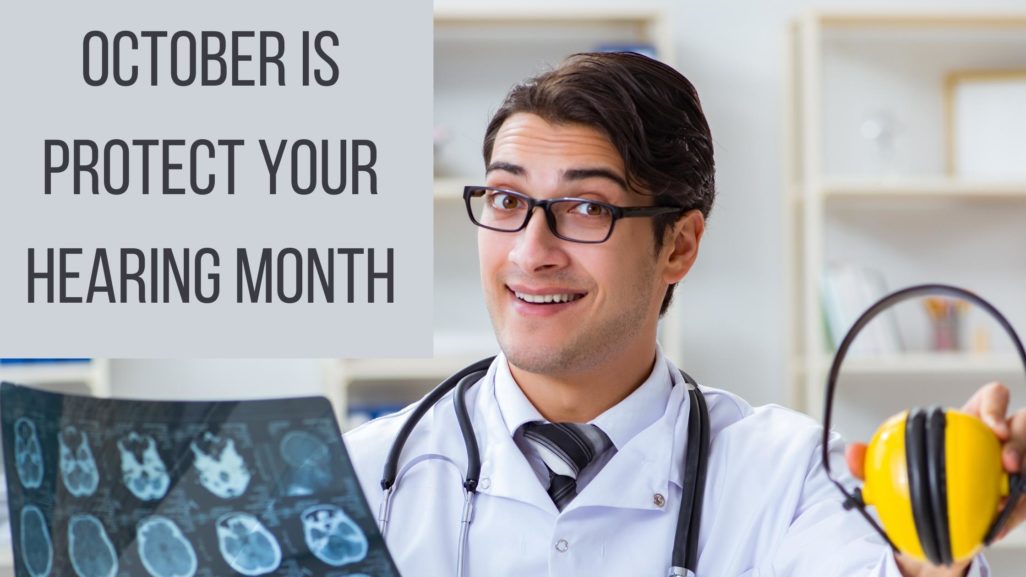THis month is all about protecting your hearing! Nearly 1 in 8 people of all ages have some degree of imapired hearing. Impacting over 48 million people, more and more young people are at high risk for hearing loss. The World Health Organization estimates that over 1 billion people globally (ages 12-35) are currently vulnerable to developing hearing loss due to exposure to loud noise. One time or consistent absorption of loud noise is one of the most common causes of hearing loss. We are regularly surrounded by increased levels of noise in daily life so it is incredibly important to practice ways to protect your hearing!
How Hearing Works
The auditory system is how we detect, process, and understand sound. It consists of critical components that work together to absorb and translate incoming sound information. This includes:
- Outer ear: the most visible part of the ear, collects soundwaves from the environment which travel through the ear canal and land on the eardrum causing it to vibrate.
- Middle ear: the vibrations from the eardrum activate the ossicles: three tiny bones that help propel the sound to the inner ear.
- Inner ear: consisting of the cochlea, filled with fluid and sensory cells (also called hair cells) that convert soundwaves into electrical signals.
The auditory nerve then carries these signals to the brain which further processes and assigns meaning to the sound, making it recognizable.
Loud Noise & Hearing Loss
Though everyday sounds are not necessarily harmful for hearing, people are regularly exposed to higher levels of noise that can be hazardous. This includes being in loud venues, attending sporting events, using household appliances (like power tools), listening to audio on personal electronic devices etc. According to the Centers for Disease Control and Prevention:
- more than 4 out of 5 adults in the U.S. never (or very rarely) wear hearing protection at loud sports events or in entertainment venues.
- 5 in 10 young people listen to their music or other audio too loudly.
- 4 in 10 young people are around dangerous levels of noise during events like concerts and sports games.
Exposure to loud noise repeatedly over time can significantly contribute to impairing hearing. Loud noise can cause the tiny hair cells in the inner ear to lose sensitivity and lead to their eventual death. These hair cells – there are around 12,000 in each ear – unlike other types of cells, do not regenerate. There are also no medical interventions to restore these cells so once they experience damage, it results in permanent hearing loss.
Tips to Protect Hearing Health
There are a variety of ways that you can protect your hearing health. Practicing safety measures can significantly reduce your risk of developing hearing loss. Useful tips you can start with include the following:
- Reduce exposure to loud noise: avoid noisy environments as much as you can. You can do this by avoiding restaurants during peak hours, taking alternate routes that involve less traffic and environmental noise, reducing the amount of time (and volume) spent listening to audio etc.
- Wear hearing protection: another useful way to reduce noise exposure is by wearing hearing protection. This includes headphones, earbuds, earmuffs etc. which offer a protective barrier for your ears. Hearing protection reduces the amount of sound you absorb and the impact of incoming soundwaves.
- Maintain low volume: sound from personal audio devices poses such a high risk for hearing loss. Be sure to maintain lower volume settings, a great way to do this is by investing in noise cancellation headphones which are designed to minimize background noise. This prevents you from increasing the volume on your device while navigating louder environments.
- Take listening breaks: your ears and brain are constantly absorbing and processing sound throughout the day. Give your auditory system a break by turning off sources of sound so that you are in a quieter space.
Use this month as a reminder to prioritize your hearing health! You can commit to this by scheduling an appointment for a hearing test. Facilitated by a hearing healthcare specialist, hearing tests involve a painless process that assesses your hearing health. This identifies any impairment and establishes what your hearing needs are. Treating hearing loss offers countless benefits that significantly improve the quality of your daily life!


